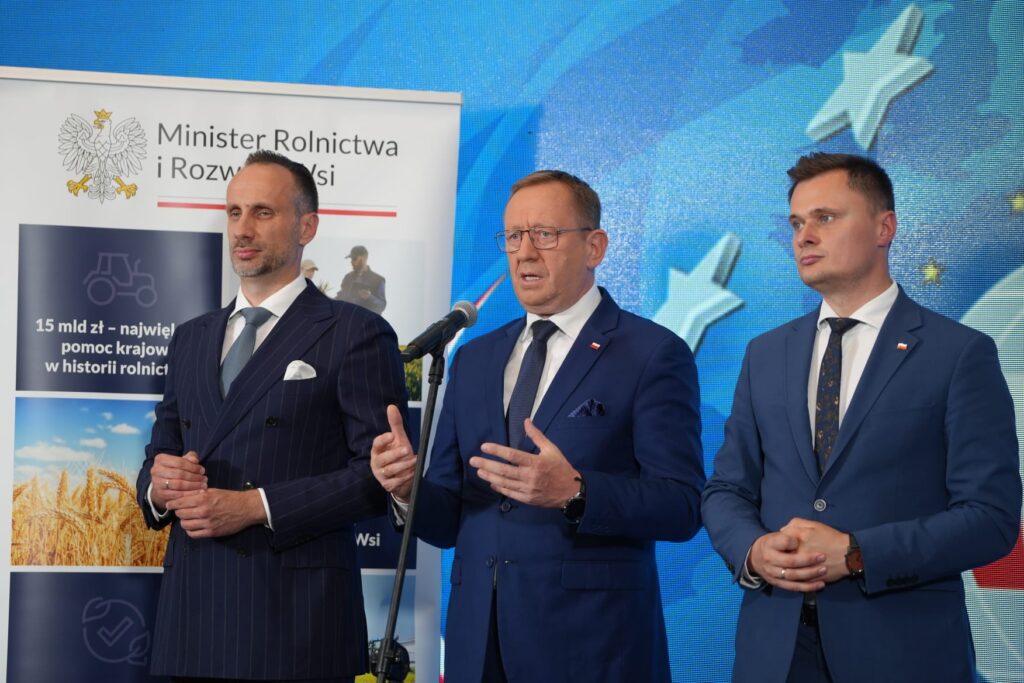
“The agriculture ministers of the frontline countries are in favor of extending the ban on imports of Ukrainian grain and we are doing everything to make this happen” – the Polish Minister of Agriculture and Rural Development Robert Telus said during a conference in Karpacz on the XXXII Economic Forum. The minister was accompanied by Secretary of State Janusz Kowalski and Undersecretary of State Krzysztof Ciecióra. “Ukraine will file a lawsuit against Poland and the EU in the World Trade Organization” – Ukrainian Deputy Minister of Economy Taras Kachka said in response.
“Ukraine plans to file a lawsuit against Brussels and EU member states in the World Trade Organization (WTO) if they do not lift restrictions on the export of its agricultural products to the Community this month” – agroportal.ua wrote.
“With full respect and gratitude to Poland, if any bans are introduced after September 15, Ukraine will file a lawsuit against Poland and the EU in the WTO” – Kachka said. In his opinion, the restrictions introduced are inconsistent with the free trade agreement concluded in 2014 between the EU and Ukraine.
At the last informal EU Council of Ministers for Agriculture, European Union Commissioner for Agriculture Janusz Wojciechowski cited data on grain exports from Ukraine. “Before the ban on grain imports to frontline countries, Ukraine exported about 3 million tons of grain to the EU by land at the beginning of the year. After the ban, it dropped to about 2.2 million tons, but now it has returned to the level of about 3-3.4 million tons” – Minister Robert Telus reported. “This shows that closing imports to our five countries does not hinder us in any way” – the head of the Polish Ministry of Agriculture emphasized.
The situation is similar when it comes to pork, for which the EU borders were also closed for some time. According to the same Ukrainian portal agroportal.ua, the profitability of pork production has become higher than before the war. “The economic element of pig breeding is currently quite attractive, as the profitability of producing 1 kg of pork has become higher than before the war. The main factors in the growth of such an indicator are both feed prices, which constitute 75-85% of the production cost, and the economic factor” – quotes expert Maksym Hopka from the press office of the Ukrainian Agrarian Business Club. Hopka took part in an international forum on pig breeding.
“Currently, joint efforts of the state and business sectors are aimed at opening the markets of Central Asian countries, the European Union and China. To be ready to occupy its niche, every enterprise must know how to obtain a special permit. Additionally, at the state level, the preparation path for accreditation of pork exports to the EU market includes audits in the field of food safety and animal diseases” – he added. It is worth noting here that Ukrainian grain, if it is to reach the EU market, should meet EU standards, but it does not. It is not without reason that it was imported to Poland as technical grain, as well as to other European Union countries that wanted to support Ukraine financially in the face of Russian aggression. The Ukrainian authorities did not appreciate this gesture and are threatening to sue EU to the WTO. Meanwhile, it is enough to test Ukrainian grain for the presence of pesticides to introduce an absolute ban on its import into the EU until Ukraine starts complying with EU standards. The same applies to pork.
The position of the Polish government is clear. “Whatever decision the European Commission makes on this matter, although we would like it to be good and amicable, we will make ours. We will certainly maintain the ban on grain imports to our country, because it is in the interest of the Polish farmer, in the interest of Poland” – Minister Robert Telus emphasized with focus.

Poland has introduced a ban on the import of agricultural products from Ukraine under agreements with the European Commission. The restriction is to last until September 15, however – as emphasized by the head of the Polish government, Mateusz Morawiecki – if after this date the mechanisms and regulations preventing the destabilization of the Polish market are not developed in the EC, the Polish government will implement it unilaterally.
There is one more thing worth paying attention to. There are 93 agroholdings in Ukraine, which, according to official information from the Ukrainian Ministry of Agriculture, hold approximately 32 percent of all agricultural land in Ukraine. Meanwhile, according to unofficial data, it is as much as 47% and this percentage increases every year. In the last decade these large corporations have used 85 percent of the entire budget of Ukraine allocated to agriculture and they dictated the prices of agricultural products. They are also the main exporters of Ukrainian grain to the West, as they have the ability to transport agricultural produce. And it is their interests that the government of Volodymyr Zelensky is fighting for. It should be emphasized that at least some of these corporations are making new investments in Ukraine despite the ongoing war, which means that they expect profits. However, Ukrainians apparently do not intend to adapt to the regulations in force in the EU, but to flood the community with their relatively cheap products that do not meet the standards adopted on the EU market. Representatives of the Ukrainian state are so brazen that they threaten to take proceedings before the WTO if the EU does not meet their claims.
Anna Wiejak
